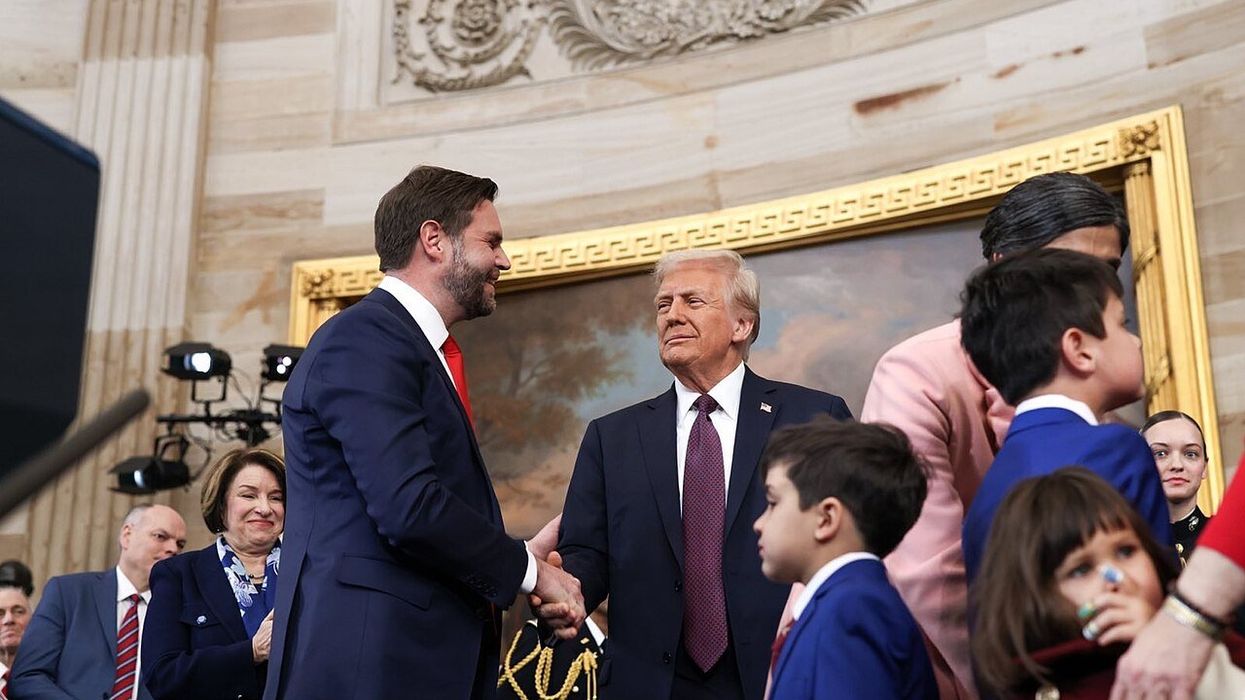'Like a unicorn': Legal analysts demolish Trump’s 'lunatic fringe' arguments on key issue

Donald Trump and Vice President JD Vance on January 20, 2025 (Wikimedia Commons)
January 21, 2025 | 01:12PM ETImmigration
After President Donald Trump issued an executive order ending birthright citizenship on Monday night, January 20 — his first night back in the White House — the American Civil Liberties Order (ACLU) wasted no time responding with an aggressive lawsuit against the Trump Administration.
Trump's executive order, according to the ACLU, is blatantly unconstitutional — as birthright citizenship is protected by the U.S. Constitution's 14th Amendment.
ACLU Executive Director Anthony D. Romero, in an official statement, said, "Denying citizenship to U.S.-born children is not only unconstitutional — it's also a reckless and ruthless repudiation of American values. Birthright citizenship is part of what makes the United States the strong and dynamic nation that it is. This order seeks to repeat one of the gravest errors in American history, by creating a permanent subclass of people born in the U.S. who are denied full rights as Americans."
READ MORE: 'She lied to us': Ex-Gabbard staffers speak out about 'insane' meeting with Syrian dictator
Romero added, "We will not let this attack on newborns and future generations of Americans go unchallenged. The Trump Administration's overreach is so egregious that we are confident we will ultimately prevail."
Forbes legal reporter Alison Durkee, in an article published on January 21, examines the arguments in Trump's executive order on birthright citizenship and what legal experts are saying about his claims.
"Trump could not undo the 14th Amendment's provision unilaterally through an executive order," Durkee explains. "In order to amend the Constitution, both chambers of Congress would have to pass the amendment with a two-thirds majority, and it would also have to be approved by at least three-quarters of the states. Instead, Trump's executive order claims the 14th Amendment has 'never been interpreted' to give universal citizenship to everyone born in the U.S. — adopting a theory that's been pushed by a minority of legal experts, which claims the 14th Amendment granting birthright citizenship to people who are 'subject to the jurisdiction' of the U.S. means the amendment doesn't apply to children of undocumented immigrants who are residing in the U.S. unlawfully or people who aren't permanent residents."
In separate lawsuits, Durkee observes, the ACLU and Lawyers for Civil Rights "echo most legal experts, who do not accept Trump's interpretation of the law."
READ MORE: Trump Inauguration dubbed 'a coronation of our country's descent into oligarchy'
"Former United States Military Academy law professor Margaret Stock described it to NPR in 2018 as a 'lunatic fringe argument,'" Durkee notes, "and University of Massachusetts, Amherst, professor Rebecca Hamlin told the outlet any lawyer who believes it is 'like a unicorn.'"
According to Durkee, the birthright citizenship issue is "likely to go the U.S. Supreme Court."
"Trump's executive order directs federal, state and local agencies not to issue any documents that confer citizenship to people born in the U.S. to parents who aren’t citizens or lawful residents," Durkee explains. "That does not apply retroactively for people who have already been born, however: the order will only apply to people who are born at least 30 days after the executive order was issued Monday. That means people who are already U.S. citizens born to parents who weren’t permanent residents won't have any issues applying for passports, for instance."
READ MORE: 'Operation Aurora': Denver suburb on edge as Trump takes office
Read the full Forbes article at this link.